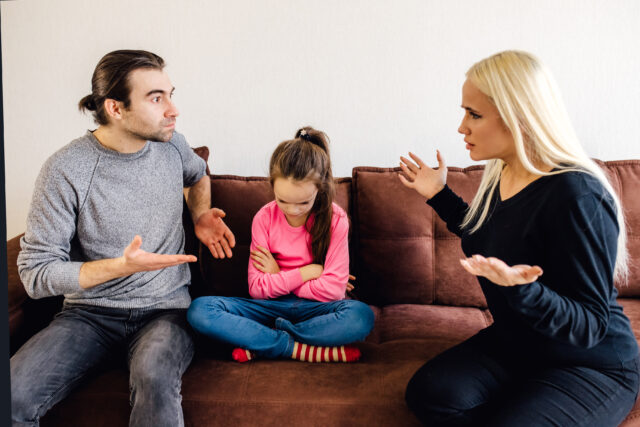If your parents stayed together but were miserable when you were a kid, it can’t have been a good situation.

You saw them fighting all the time and knew they were unhappy together, and while you didn’t want them to split, sometimes you probably wondered if it might be better if they did. You’re all grown up now, and your parents likely either ironed out their issues or they eventually got divorced. Either way, the effects of witnessing their dysfunctional partnership growing up likely gave you these qualities.
1. You’re quick to sense conflict.

If conflict was a regular part of home life, you might pick up on tension faster than other people. Small changes in tone or body language can put you on alert. A bit of awareness can be helpful, but it can also feel exhausting. You’ve learned to read the room out of habit. It’s a skill that helps, even if it sometimes keeps you on edge.
2. Confrontation isn’t your favourite thing.

If arguments were a source of stress, avoiding confrontation can feel safer. You might prefer to let things go instead of diving into tough conversations. Keeping the peace feels easier than stirring things up. While it helps you avoid drama, it can also mean holding back your real thoughts. Finding a middle ground where you’re comfortable speaking up can be a challenge.
3. You like handling things on your own.

Growing up with some uncertainty may have made you pretty self-reliant. Depending on anyone else can feel a bit risky if you’re used to managing on your own. Your independence is a strength, though it can sometimes make asking for help harder than it needs to be. You’ve learned to handle things solo out of necessity. Letting people in takes a bit more effort but can feel worth it.
4. Stability feels like a must.

If home life was unpredictable, you might crave stability and routine as an adult. Having a steady environment gives you a sense of control and comfort. You’re probably not a huge fan of surprises or sudden changes. Routine feels like a safe place, even if flexibility sometimes feels challenging. Stability is a way to create the calm you didn’t always have.
5. Trust takes time.

Seeing close relationships struggle can make trust feel complicated. You might find yourself questioning people’s intentions or worrying things could change suddenly. Trusting people can take a bit longer when you’ve seen things fall apart. It doesn’t mean you don’t trust at all—it just takes more time to feel secure. Building trust feels like a step-by-step process.
6. You’re pretty independent in relationships.

If you grew up watching an unhappy relationship, you might value a bit more space in your own. You’re used to looking after yourself, so relying heavily on a partner can feel unfamiliar. Being so self-sufficient helps you feel grounded, but can also create some distance. Having room to breathe in relationships feels important. Finding a balance between closeness and independence takes work.
7. Commitment makes you cautious.

Seeing a challenging marriage can make long-term commitment feel daunting. You may hold back until you’re absolutely sure about someone to avoid repeating old patterns. It’s not about avoiding relationships, just being extra careful with them. A bit of caution can help you avoid impulsive decisions, but might also make deep connections feel a bit slower. Taking time to trust that things can be different is a process.
8. You’ve probably taken on the role of peacekeeper.

If tension was common, you might have learned to step in and smooth things over, even as a kid. You’re used to trying to keep situations calm, whether it’s with family or friends. Being a peacekeeper helps you avoid conflict, but it can also feel like a big responsibility. While you’re good at calming things down, it can get tiring. Knowing when to step back helps balance this tendency.
9. Sharing feelings isn’t second nature.

If emotions weren’t openly discussed at home, expressing your own might feel uncomfortable. You may be used to holding things in to avoid upsetting anyone. Unfortunately, this habit can make it harder to build close connections, as you’re more likely to keep things private. Opening up doesn’t come naturally but can make relationships stronger. It’s something that can take practice to feel comfortable with.
10. You overthink choices in relationships.

Decision-making can feel loaded, especially in relationships, as you try to avoid repeating patterns you saw growing up. You may find yourself analysing every detail, hoping to make the “right” choice. While it’s natural to want to be careful, this can lead to second-guessing and stress. Taking things one step at a time can help ease your overthinking. Trusting your instincts is something you’re still working on.
11. People-pleasing comes naturally.

Trying to keep things smooth at home may have made you more focused on keeping everyone else happy. You might find yourself trying to make sure everyone around you is comfortable to avoid any tension. While it makes you considerate, it can also mean ignoring your own needs. Pleasing people is nice, but it can be draining when it goes too far. Setting boundaries can help balance things out.
12. You’re highly tuned into other people’s feelings.

Growing up around unhappiness may have made you more sensitive to other people’s emotions. You can sense when something’s off with someone, even if they don’t say it outright. Your empathy helps you connect with people, though it can mean you sometimes take on their feelings as your own. Knowing where to draw the line helps you stay grounded. Being empathetic is a strength when balanced with boundaries.
13. You sometimes wonder what “healthy” really looks like.

If your idea of relationships wasn’t positive, you might question what a healthy one should be. You may find yourself asking whether certain behaviours are normal or if you’re just following old patterns. The uncertainty can be confusing, but it’s also part of learning. Understanding that healthy relationships exist is reassuring. Over time, you build your own version of what feels right.
14. You put a lot of value on open communication.

If communication was lacking at home, you might prioritise it now. You’re not one to leave things unsaid or make assumptions—you want clarity in your interactions. Focusing on being direct is a way to create the openness you didn’t always experience. It helps you build stronger connections with people. Honest conversations feel like a must in any relationship you’re in.




